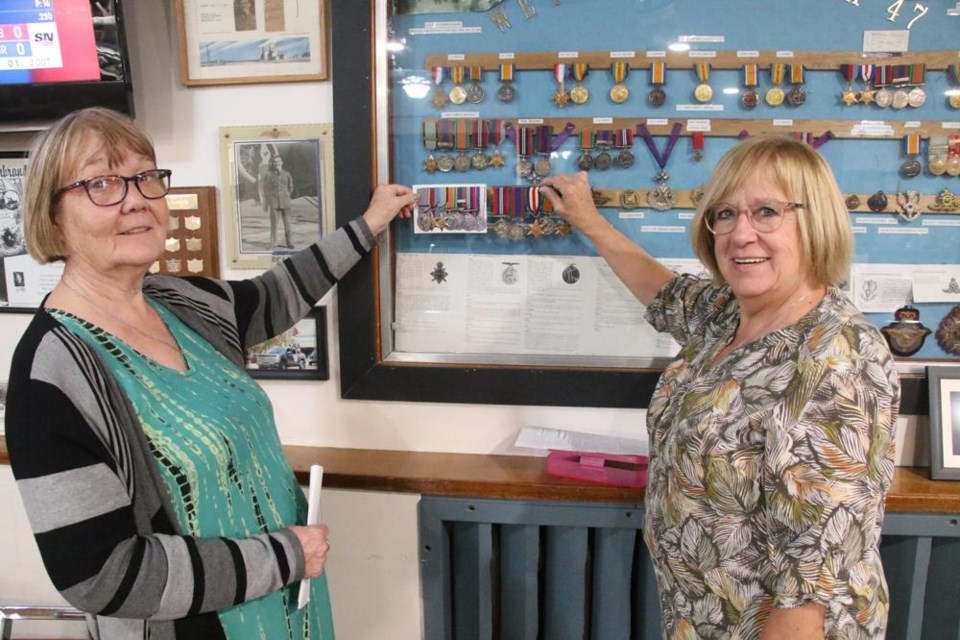WEYBURN – The Mitchell family of Weyburn gave heavily to Canada’s war effort, as seven sons of T.H. and Eva Mitchell enlisted in the armed forces to fight in the Second World War. One died during in a bombing raid, and another earned the Distinguished Flying Medal.
Members of the family gathered in Weyburn for a reunion in September, and reminisced about those who served in wartime. They noted a kinship to the “famous” Mitchell from Weyburn, author W.O. Mitchell, who was a cousin of theirs.
In the First World War, T.H.’s brother John joined the army in April of 1914, and was killed in action at Vimy Ridge, France, in 1917.
The sons of T.H. and Eva included Bruce, who enlisted in the RCAF in 1940; Ormond, who enlisted in the RCASC in 1939; Rex, who enlisted in the RCAF in 1938, and died in 1944 as a member of 408 Squadron over Hamburg, Germany; Don, who enlisted in the RCAF in 1942 and earned the Distinguished Flying Medal as a member of 426 Squadron; Jim, who enlisted in 1940 as a medic; Grant, who enlisted in 1943; and Clary, who enlisted in the army in 1944 as soon as he turned 18.
A granddaughter of T.H. and Eva, Janice Howden, had a son, Eryn Bruce Keen, who served a tour with the Princess Patricia’s Light Infantry in Afghanistan in 2006, and he returned safely.
Writing about what her grandmother went through, she said, “I’ve always wondered what emotions Grandma Mitchell felt when all of her seven boys joined the armed forces in the 1940s. Was there pride, honour, fear? Why did all these boys volunteer for service for their country? Was it out of duty and national pride, or the big adventure, a way of leaving the harsh reality of their lives back on the farm in the 1930s and 40s?
“Whatever the reason, I’m sure she spent a lot of time listening for news about the war overseas and praying for her boys’ safe return. And then the news that one wasn’t coming back …”
In the official report about the mission Rex was on in July of 1944 to carry out bombing operations over Hamburg, “the aircraft was due to return to this aerodrome at 0345 hours on the 29th July 1944, but unfortunately nothing further has been heard from any members of the crew since the time of takeoff.”
Rex served as a navigator, had been on 26 missions and logged 121.1 hours in the air, according to the records from his last flight.
His name is inscribed on the Runnymede Memorial in England, as one of 3,050 Canadian airmen, with around 20,000 airmen listed altogether who have no known grave.
In an official letter from the minister of National Defence for Air, sent in November of 1944, the details of how Donald Mitchell earned his medal were explained:
“Flight sergeant Mitchell has attacked with the greatest degree of accuracy numerous targets in Germany and occupied countries. On one occasion in April, 1944, in spite of an attack by a Junkers 88 and fire which had broken out in his aircraft, this airman continued to give directions to the pilot on his bombing run. His exceptional display of coolness and tenacity of purpose was largely responsible for the complete success of the mission.”
He flew a total of 34 missions as bombardier on Halifax and Lancaster bombers. He was back in Canada by Christmas of 1944, and posted on the West Coast when the war in Europe ended, and he flew no more.
After the war, he joined the Saskatchewan Power Corporation, and was the district electrical superintendent in Watrous until he retired in 1978.
Brother Jim served in Germany until the end of the war, then he was in the Canadian Public Service after the war, serving in various posts in B.C., Germany and then in Ottawa until his retirement in 1978.
While the six brothers were still alive, they often met in Weyburn to mark their father’s birthday until he passed away.
The last brother, Bruce, farmed at Osage and Tyvan, and retired to Weyburn, passing away a few years ago.




